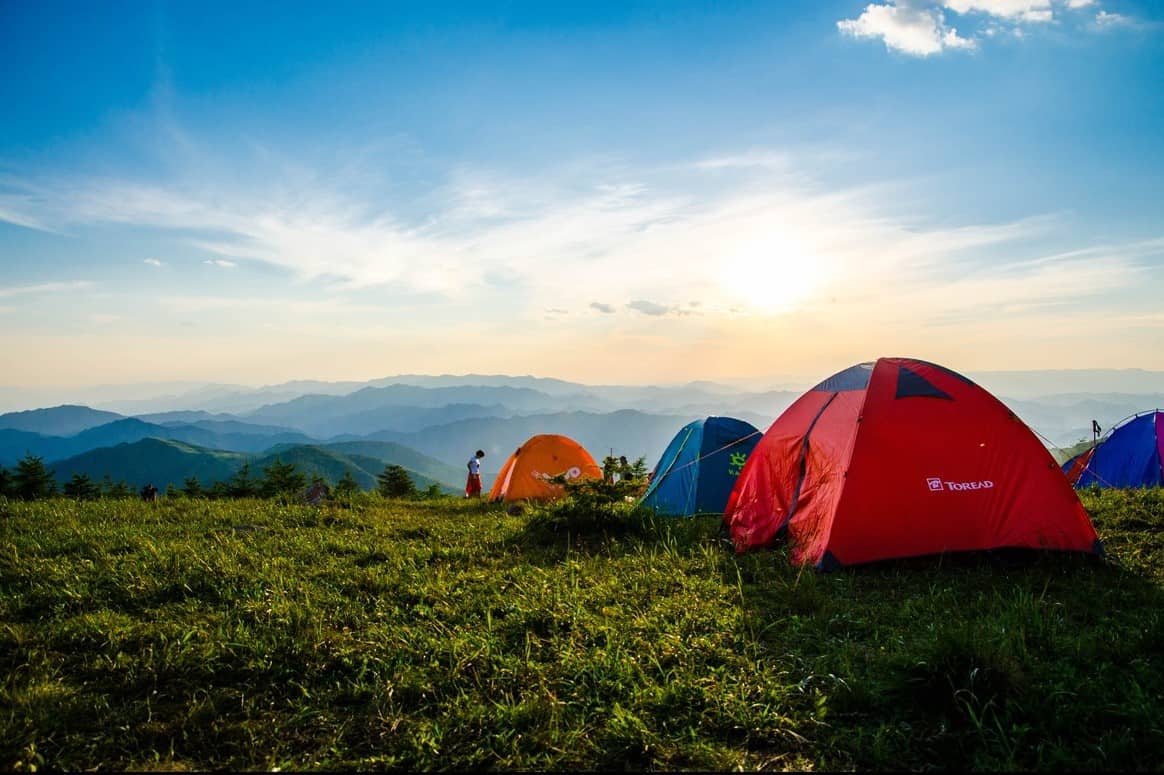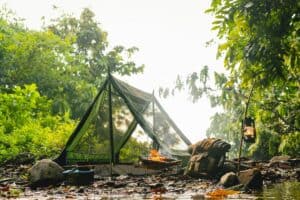Are you feeling burnt out by the daily grind of life? Do you long for a chance to escape the chaos and reconnect with nature? If so, then camping may be just the activity you need. Not only is camping a fun and affordable way to get away, but it also provides numerous benefits for both your physical and mental well-being. In fact, research has shown that spending time outdoors can reduce stress levels, improve mood, and boost creativity.
In this blog post, we’ll delve into the fascinating world of camping benefits and explore five surprising benefits that you may not have been aware of before. We’ll uncover the importance of camping and how it can help you to disconnect from technology and reconnect with nature, which can lead to improved sleep quality, reduced anxiety, and enhanced problem-solving skills.
Whether you’re a seasoned camper or new to the activity, this post is designed to help you understand the many benefits of camping and inspire you to plan your next camping trip. So, join us as we explore the hidden gems of camping and discover why it’s more than just a weekend getaway. Let’s dive into the world of camping and discover the amazing benefits it has to offer!
Importance of camping:
The importance of camping cannot be overstated. In today’s world, we spend so much of our time indoors, in front of screens, and disconnected from nature. Camping provides an opportunity to escape from the hustle and bustle of everyday life, to unplug from technology, and to reconnect with the natural world.
When we camp, we have the chance to slow down and appreciate the simple things in life. We can spend time with loved ones, explore new places, and create lasting memories. Camping also provides a sense of freedom and adventure that can be hard to find in our daily routines.
Beyond the mental and emotional benefits, camping can also have a positive impact on our physical health. It encourages us to be more active and can improve our sleep quality, which in turn can boost our overall health and well-being.
Furthermore, camping is an excellent way to learn important life skills such as problem-solving, self-sufficiency, and adaptability. By being in nature, we learn to work with limited resources, to navigate unfamiliar terrain, and to adapt to changing conditions. These skills can be useful not only in camping but in other areas of life as well.
In short, the importance of camping lies in its ability to provide a much-needed break from our busy lives, to help us reconnect with nature, and to teach us valuable life skills. Whether you’re looking to escape for a weekend or take an extended trip, camping can be a transformative experience that leaves you feeling refreshed, rejuvenated, and inspired.
Camping Benefits:
- Improved sleep quality
- Reduced anxiety and stress
- Enhanced problem-solving skills
- Disconnecting from technology and reconnecting with nature
- Improved physical health
These benefits may not be immediately obvious when you think of camping, but they have been proven through research and experienced by countless campers. In the following sections, we will delve into each benefit in more detail and provide personal anecdotes and scientific evidence to support the claims. By the end of this post, you’ll be convinced that camping is not only a fun activity but also a valuable tool for improving your mental, emotional, and physical well-being.
Benefit 1: Improved sleep quality
One of the surprising benefits of camping is that it can improve the quality of your sleep. Many people struggle with getting a good night’s rest due to the stress and distractions of modern life. However, when you’re camping, you’re removed from the artificial light and noise that can disrupt sleep.
Research has shown that exposure to natural light during the day and darkness at night can help regulate your body’s sleep-wake cycle, also known as your circadian rhythm. Camping provides ample opportunities to get outside during the day and experience natural light, while the absence of electronics and artificial lighting at night can promote a deeper and more restful sleep.
Additionally, camping often involves physical activity such as hiking, swimming, and setting up camp, which can tire you out and lead to better quality sleep. In fact, studies have found that people who engage in regular physical activity tend to sleep better than those who don’t.
In my personal experience, I’ve found that camping has helped me get some of the best sleep of my life. I remember camping in the Rocky Mountains last summer, and after a long day of hiking, I slept soundly through the night and woke up feeling refreshed and energized.
In summary, camping can help improve the quality of your sleep by promoting exposure to natural light during the day, reducing exposure to artificial light at night, and engaging in physical activity that tires you out. If you struggle with getting a good night’s rest, consider taking a camping trip to help reset your sleep-wake cycle and improve the quality of your sleep.
Benefit 2: Reduced anxiety and stress
Another surprising benefit of camping is that it can help reduce feelings of anxiety and stress. In our fast-paced and constantly connected world, it’s easy to become overwhelmed and stressed out. Camping provides an opportunity to unplug from technology and the daily stresses of life and immerse yourself in nature.
Research has shown that spending time in nature can help reduce levels of cortisol, the stress hormone, and increase feelings of relaxation and well-being. Camping can also provide a sense of solitude and quiet that can be difficult to find in our modern lives, allowing us to reflect and recharge.
In addition to the calming effects of nature, camping can also provide a sense of accomplishment and self-reliance. Setting up camp, building a fire, and cooking meals without the modern conveniences we’re used to can be challenging, but the satisfaction of accomplishing these tasks can be incredibly rewarding and boost self-esteem.
In my personal experience, I’ve found that camping has been a great way to reduce stress and anxiety. Whenever I’m feeling overwhelmed or anxious, a weekend camping trip can provide the perfect escape to reset and recharge.
In summary, camping can help reduce feelings of anxiety and stress by providing an opportunity to unplug from technology and immerse yourself in nature, reducing levels of cortisol, and providing a sense of accomplishment and self-reliance. If you’re feeling stressed out and overwhelmed, consider taking a camping trip to help reduce stress and improve your mental well-being.
Benefit 3: Enhanced problem-solving skills.
Camping can also help improve your problem-solving skills. When you’re out in nature, you’re often faced with unexpected challenges and situations that require you to think on your feet and come up with creative solutions.
For example, if your tent gets damaged in a storm, you’ll need to figure out how to repair it quickly in order to stay dry. Or if you get lost on a hike, you’ll need to use your navigational skills to find your way back to camp.
These types of challenges can help improve your problem-solving skills and your ability to think critically. They can also help build your resilience and your confidence in your ability to handle unexpected situations.
Camping can also provide an opportunity to learn new skills and gain new knowledge. For example, you might learn how to start a fire or cook a meal over an open flame, which can be valuable skills to have in emergency situations or in the great outdoors.
In my personal experience, I’ve found that camping has helped me become a more resourceful and adaptable problem solver. I’ve had to think creatively to solve unexpected challenges, and I’ve learned valuable skills that have helped me in other areas of my life as well.
In summary, camping can help improve your problem-solving skills by providing opportunities to think creatively and come up with solutions to unexpected challenges. If you’re looking to build your problem-solving skills and gain new knowledge and experiences, consider taking a camping trip.
Benefit 4: Disconnecting from technology and reconnecting with nature.
In our increasingly digital world, it’s easy to become disconnected from nature and the world around us. We spend so much time glued to our screens that we forget to look up and appreciate the beauty of the world around us. Camping provides an opportunity to disconnect from technology and reconnect with nature, which can be incredibly beneficial for our mental and physical well-being.
When you’re camping, you’re forced to unplug from technology and focus on the present moment. Without the constant distractions of social media, emails, and text messages, you’re able to fully immerse yourself in nature and appreciate its beauty.
Camping can also provide an opportunity to learn new skills and connect with others in a meaningful way. For example, you might spend time learning how to start a fire or set up a tent, or you might bond with your camping companions over a shared love of nature and the outdoors.
In my personal experience, I’ve found that disconnecting from technology and reconnecting with nature can be incredibly refreshing and rejuvenating. I always feel more relaxed and present after a camping trip, and I find that it helps me put things in perspective and appreciate the simple things in life.
In summary, camping provides an opportunity to disconnect from technology and reconnect with nature, which can be incredibly beneficial for our mental and physical well-being. If you’re feeling overwhelmed by technology and the digital world, consider taking a camping trip to unplug and reconnect with nature.
Benefit 5: Improved physical health.
Camping can also have a positive impact on your physical health. When you’re camping, you’re often more active than you would be in your day-to-day life, which can have a number of health benefits.
For example, hiking is a common activity when camping, and it provides a great cardiovascular workout. Not only does hiking help improve your overall fitness, but it can also help reduce your risk of chronic diseases such as heart disease and diabetes.
Additionally, camping often involves other physical activities such as swimming, fishing, and biking, which can provide a full-body workout and help improve your strength and endurance.
Camping can also provide a break from the sedentary lifestyle that many of us live. When you’re camping, you’re often moving around more and spending less time sitting at a desk or on the couch, which can help reduce your risk of obesity and other health problems associated with a sedentary lifestyle.
In my personal experience, I’ve found that camping has been a great way to stay active and improve my physical health. I love hiking and exploring new trails, and I always feel like I get a great workout when I’m camping.
In summary, camping can help improve your physical health by providing opportunities for cardiovascular exercise, strength training, and reducing sedentary behaviour. If you’re looking for a fun and active way to improve your overall fitness, consider taking a camping trip.
Conclusion:
We’ve explored some of the surprising benefits of camping and the importance of this outdoor activity. We discussed how camping can improve your mental and physical health, provide a much-needed break from technology, enhance your problem-solving skills, and give you an opportunity to reconnect with nature.
Camping is an excellent way to get outside, explore new places, and have fun with family and friends. By disconnecting from technology and reconnecting with nature, you can improve your overall well-being and gain new experiences and knowledge.
So if you’re looking for a way to improve your mental and physical health, connect with nature, and gain new skills, consider taking a camping trip. Whether you’re a seasoned camper or a newbie, there are plenty of options for every level of experience.
As the famous naturalist John Muir once said, “In every walk with nature, one receives far more than he seeks.” So go out there and experience the benefits of camping for yourself. You might just be surprised at how much it can enrich your life.



